Change the size of your slides
In earlier versions of PowerPoint, slides were more square (a 4:3 aspect ratio). The default slide size in PowerPoint 2013 and PowerPoint 2016 is widescreen (a 16:9 aspect ratio). However, you can resize your slides to 4:3—and even to a custom size. You can also set slide sizes to match a variety of common paper sizes and other screen elements.

If you want to switch from landscape to portrait orientation, see Change the page orientation in PowerPoint between landscape and portrait.
Change the slide size from widescreen (16:9) to standard (4:3), or from standard to widescreen
-
First, make sure you're in Normal view (on the View tab, click Normal). Then click the Design tab, and click Slide Size in the Customize group.
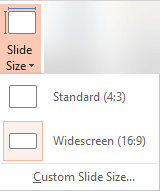
Tip: The Slide Size button is also available in Slide Master view on the Slide Master tab.
-
Click Standard (4:3) or Widescreen (16:9).
When PowerPoint is unable to automatically scale your content, it will prompt you with two options:
-
Maximize: Select this option to increase the size of your slide content when you are scaling to a larger slide size. Choosing this option could result in your content not fitting on the slide.
-
Ensure Fit: Select this option to decrease the size of your content when scaling to a smaller slide size. This could make your content appear smaller, but you'll be able to see all content on your slide.

-
The 16:9 widescreen setting is the default value for new presentations you create. When you change the slide size for a presentation, the size you choose only applies to that presentation. However, you can make it easy to create a new 4:3 presentation for yourself whenever you want—by defining a custom theme that uses the 4:3 aspect ratio. See Make a new slide size the default for new presentations below.
Resize your slides to custom dimensions and other common paper and screen sizes, including Outline
-
First, make sure you're in Normal view (on the View tab, click Normal). Then on the Design tab, click Slide Size, and then click Custom Slide Size.
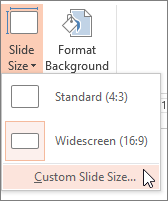
Tip: The Slide Size button is also available in Slide Master view on the Slide Master tab.
-
Do one of the following in the Slide Size box:
-
Set the height and width dimensions, and the orientation.
-
Click the down arrow next to Slides sized for, and pick an option.
There are two options for 16:9 aspect ratios: Widescreen and On-screen Show (16:9). Here's the difference between the two:
-
On-screen Show (16:9) sets the slide dimensions to 10 in x 5.625 in.
-
Widescreen sets it to 13.333 in x 7.5 in.
Both of these options are the same aspect ratio so they will look the same in Normal View, since we automatically adjust the zoom. Widescreen (13.333 in x 7.5 in.) provides more slide surface area for the content, so that is the best choice for presentations. There are some other things to consider however, Widescreen (13.333 in x 7.5 in.) won't fit on an 8.5 x 11 sheet of paper without you having to scale it.
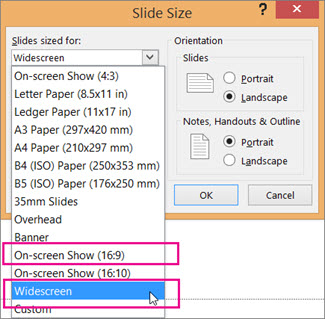
-
-
The Overhead option provides an aspect ratio very close to the standard 4:3 slide size.
-
Make a new slide size the default for new presentations
-
Start PowerPoint.
-
On the File tab of the toolbar ribbon, select New. Then double-click the Blank Presentation to create a new, empty presentation.
-
Then on the Design tab, click Slide Size. If you want a 4:3 default, select Standard (4:3) from the Slide Size drop-down list.

(If you want a different default slide size, select Custom Slide Size and then choose your size in the Slide Size dialog box, and then click OK.)
-
On the Design tab, click the More arrow in the bottom-right corner of the Themes group.

-
Select Save Current Theme.
-
Give your theme a name that you'll remember easily and click Save. Don't change the folder that the new theme is to be saved in.
-
On the Design tab, click the More arrow again in the bottom-right corner of the Themes group. You'll see your newly saved theme under a Custom group.
-
Right-click that new custom theme under the Custom heading, and then select Set as Default Theme:

-
Close PowerPoint. Don't save any files if it prompts you.
-
Open PowerPoint again. On the File tab of the toolbar ribbon, select New.
The custom theme that you just saved will be listed at the top left corner, named Default Theme. The thumbnail image will look like a widescreen slide, but in reality, when you create a new presentation based on that theme (by double-clicking that item), the presentation will have the aspect ratio that you've defined for this default theme.
The next time you open PowerPoint, you'll see your default theme in the upper-left of the theme gallery. When you select it, all the slides will be the custom size you chose by default.
Do you not have a widescreen projector? Tell us what kind of projector you use by going to PowerPoint for Windows UserVoice Forum. This will help us prioritize new features in future updates.
See Also
Change the page orientation in PowerPoint between landscape and portrait
Use portrait and landscape slide orientation in the same presentation
In PowerPoint Online you can choose between standard (4:3) and widescreen (16:9) aspect ratios. Custom sizes aren't available.
Change the slide size from widescreen (16:9) to standard (4:3), or from standard to widescreen
-
On the Design tab of the toolbar ribbon, click Slide Size in the Customize group.
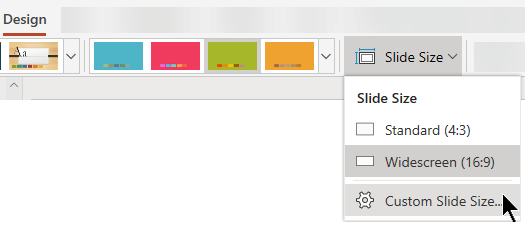
-
Click Standard (4:3) or Widescreen (16:9).
When PowerPoint Online is unable to automatically scale your content, it prompts you with two options:
-
Maximize: Select this option to increase the size of your slide content when you are scaling to a larger slide size. Choosing this option could result in your content not fitting on the slide.
-
Ensure Fit: Select this option to decrease the size of your content when scaling to a smaller slide size. This could make your content appear smaller, but you'll be able to see all content on your slide.
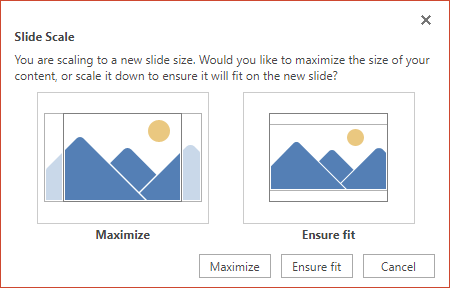
-
You can also change the orientation of all the slides in your presentation. See Change the page orientation for instructions.
See Also
Change the page orientation in PowerPoint between landscape and portrait
Change the slide size from widescreen (16:9) to standard (4:3), or from standard to widescreen
-
On the Design tab, click Slide Size.

-
Choose either Standard (4:3) or Widescreen (16:9).
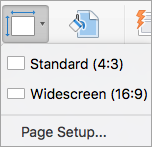
Notes: PowerPoint may prompt you about scaling your content. Choose one of the following options:
-
Scale: Select this option to decrease or increase the size of your slide content. When scaling to a smaller slide size, this could make your content appear smaller, but you'll be able to see all content on your slide.
-
Don't Scale: Select this option to maintain the size of your slide content. Choosing this option could result in your content not fitting on the slide.
-
Resize your slides to custom dimensions
-
On the Design tab, click Slide Size, and then click Page Setup.
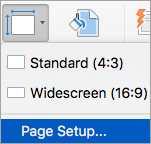
-
Do one of the following in the Page Setup box:
-
Set new height and width dimensions, or choose another orientation.
-
Click the down arrow next to Slide sized for, and pick an option.
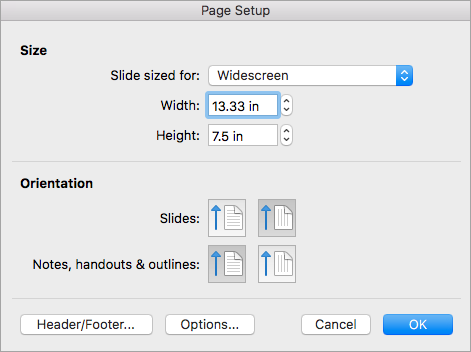
Notes: PowerPoint may prompt you about scaling your content. Choose one of the following options:
-
Scale: Select this option to decrease or increase the size of your slide content. When scaling to a smaller slide size, this could make your content appear smaller, but you'll be able to see all content on your slide.
-
Don't Scale: Select this option to maintain the size of your slide content. Choosing this option could result in your content not fitting on the slide.
-
-
Make a new slide size the default for new presentations
-
On the Design tab, click Slide Size, and then click Page Setup.

-
Follow the steps in the previous section to choose the slide size you want.
-
On the Design tab, click the More arrow below the standard themes.
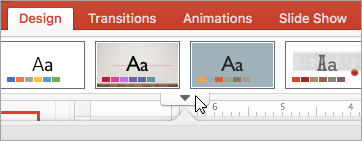
-
Click Save Current Theme at the bottom of the window.
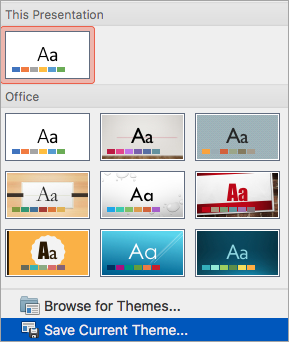
-
Give your theme a name that you'll remember easily and click Save.
-
On the Design tab, click the More arrow below the standard themes again. You'll see your newly saved theme under Custom.
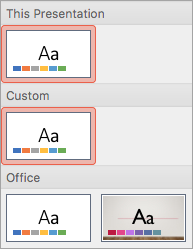
-
Right-click your new custom theme, and then click Set as Default Theme.
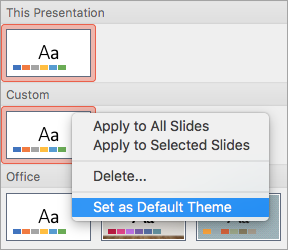
The next time you open PowerPoint, you'll see your default theme in the upper-left of the theme gallery. When you select it, all the slides will be the custom size you chose by default.
See Also
Change the page orientation in PowerPoint between landscape and portrait
No comments:
Post a Comment